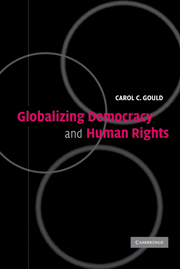Book contents
- Frontmatter
- Contents
- Acknowledgments
- Introduction: Between the Personal and the Global
- PART I THEORETICAL CONSIDERATIONS
- PART II DEMOCRACY AND RIGHTS, PERSONALIZED AND PLURALIZED
- PART III GLOBALIZING DEMOCRACY IN A HUMAN RIGHTS FRAMEWORK
- 7 Evaluating the Claims for Global Democracy
- 8 Are Democracy and Human Rights Compatible in the Context of Globalization?
- 9 The Global Democratic Deficit and Economic Human Rights
- PART IV CURRENT APPLICATIONS
- Index
8 - Are Democracy and Human Rights Compatible in the Context of Globalization?
Published online by Cambridge University Press: 23 November 2009
- Frontmatter
- Contents
- Acknowledgments
- Introduction: Between the Personal and the Global
- PART I THEORETICAL CONSIDERATIONS
- PART II DEMOCRACY AND RIGHTS, PERSONALIZED AND PLURALIZED
- PART III GLOBALIZING DEMOCRACY IN A HUMAN RIGHTS FRAMEWORK
- 7 Evaluating the Claims for Global Democracy
- 8 Are Democracy and Human Rights Compatible in the Context of Globalization?
- 9 The Global Democratic Deficit and Economic Human Rights
- PART IV CURRENT APPLICATIONS
- Index
Summary
In this chapter, I want to put the earlier discussion of globalized democracy into relation with human rights, an issue that I also pursue in a different context in Chapter 9. Yet framing their relation as a question of compatibility, as expressed in the title of this chapter, is likely to evoke a certain puzzlement. On the face of it, the question of the compatibility of democracy and human rights in the present would normally be answered with a resounding, “Of course they are.” Such an answer could appeal to two related considerations. The first is that democratic participation is in fact one of the human rights, whether in the less explicit form that it takes in Article 21 of the Declaration of Human Rights or in its fuller formulation in Article 25 of the International Covenant on Civil and Political Rights, although regrettably (and probably for political reasons at the times of their drafting), neither article uses the term “democracy” itself. Article 21 of the Declaration approaches a conception of democratic political participation by stating that
(1)Everyone has the right to take part in the government of his country, directly or through freely chosen representatives. …
(3)The will of the people shall be the basis of the authority of government; this will shall be expressed in periodic and genuine elections which shall be by universal and equal suffrage and shall be held by secret vote or by equivalent free voting procedures.
- Type
- Chapter
- Information
- Globalizing Democracy and Human Rights , pp. 183 - 200Publisher: Cambridge University PressPrint publication year: 2004



